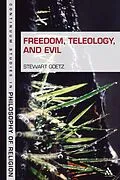In Freedom, Teleology, and Evil Stewart Goetz defends the existence of libertarian freedom of the will. He argues that choices are essentially uncaused events with teleological explanations in the form of reasons or purposes. Because choices are uncaused events with teleological explanations, whenever agents choose they are free to choose otherwise. Given this freedom to choose otherwise, agents are morally responsible for how they choose. Thus, Goetz advocates and defends the principle of alternative possibilities which states that agents are morally responsible for a choice only if they are free to choose otherwise. Finally, given that agents have libertarian freedom, Goetz contends that this freedom is integral to the construction of a theodicy which explains why God allows evil.
Autorentext
Stewart Goetz is the Ross Frederick Wicks Distinguished Professor in Philosophy and Religion at Ursinus College, USA. His previous books include The Soul Hypothesis (co-edited with Mark Baker, 2011), A Brief History of the Soul (co-authored with Charles Taliaferro, 2011), The Purpose of Life: A Theistic Perspective (2012), The Routledge Companion to Theism (co-edited with Charles Taliaferro and Victoria Harrison, 2012), and A Philosophical Walking Tour with C. S. Lewis (2015). He is the Series Editor of Bloomsbury Studies in Philosophy and Religion.
Zusammenfassung
In Freedom, Teleology, and Evil Stewart Goetz defends the existence of libertarian freedom of the will. He argues that choices are essentially uncaused events with teleological explanations in the form of reasons or purposes. Because choices are uncaused events with teleological explanations, whenever agents choose they are free to choose otherwise. Given this freedom to choose otherwise, agents are morally responsible for how they choose. Thus, Goetz advocates and defends the principle of alternative possibilities which states that agents are morally responsible for a choice only if they are free to choose otherwise. Finally, given that agents have libertarian freedom, Goetz contends that this freedom is integral to the construction of a theodicy which explains why God allows evil.
Inhalt
Chapter 1: Introduction
Chapter 2: Noncausal Agency
Chapter 3: Noncausal Agency and Its Critics
Chapter 4: Noncausal Agency and Problems of Luck
Chapter 5: The Principle of Alternative Possibilities
Chapter 6: Self-forming Choices, Life Plans, and the Problem of Evil
